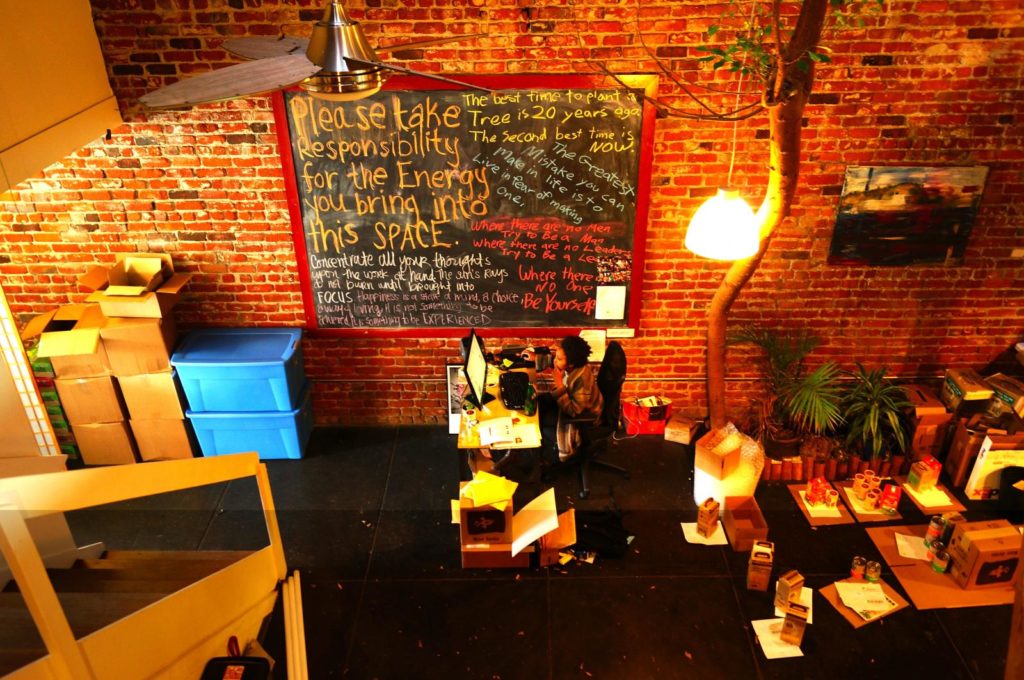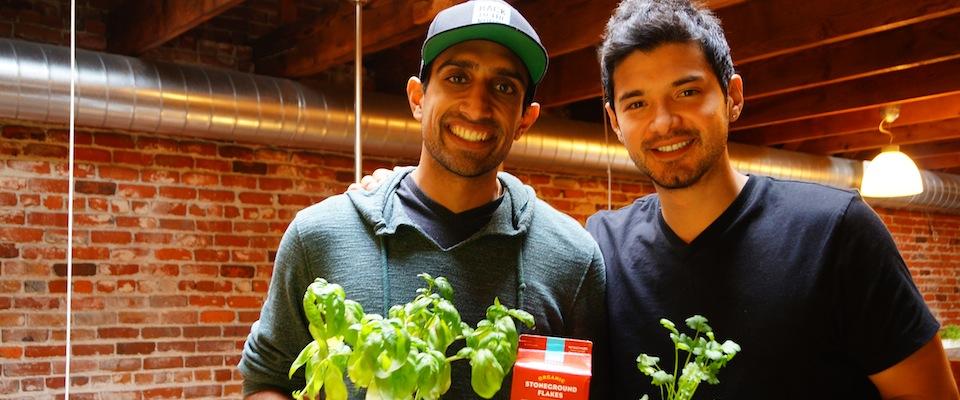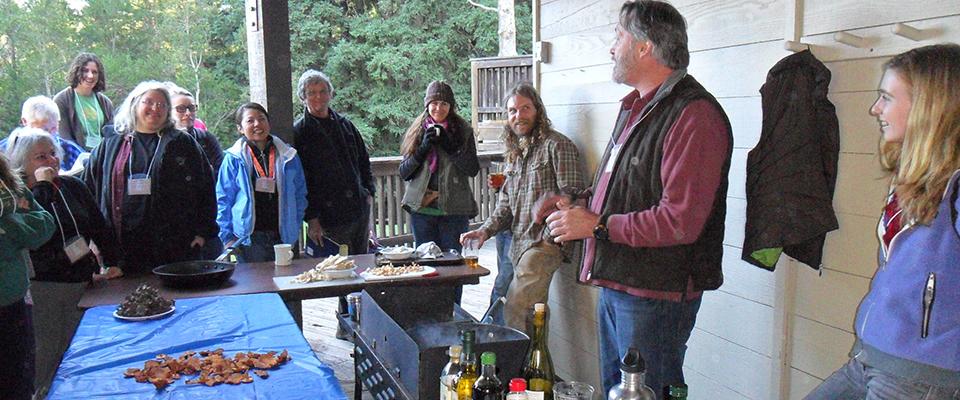It was already their final semester at UC Berkeley, but Nikhil Arora and Alejandro Velez had never met. Both were sitting in a business ethics class when something the professor said caught their interest: It might be possible to grow gourmet mushrooms from used coffee grounds. Just a few weeks later, the two were practically best friends, brought together by an idea.
“We were on Telegraph and Dwight, picking up coffee grounds from Peet’s Coffee and Tea,” explains Arora, “and we scoured YouTube for DIY tutorials on mushroom farming.” They planted ten test buckets in their fraternity kitchen, all of which became contaminated—except for one lucky bucket.
Their mushroom experiments in 2009 have since evolved into Back to the Roots, a fast-growing Oakland-based startup specializing in “ready-to-grow” and “ready-to-eat” products. They describe themselves as two Berkeley kids who went from would-be investment bankers to mushroom farmers, and then from hawking their mushrooms themselves at a Berkeley farmers’ market to seeing their expanded product line stocked at major grocers and retailers including Whole Foods, Target, Home Depot, Costco and even Urban Outfitters. They’ve received seed funding from investors such as Jamba Juice, Clif Bar, and Annie’s Inc, and were one of 15 small businesses selected to meet with President Obama after the economy went into free fall, brainstorming economic solutions to help entrepreneurs.
Arora and Velez have shared their story in TED Talks, and been featured on The Today Show, the Fox Business channel and Martha Stewart’s American Made list.
The duo say they want to build more than just a food company: They want to change how the entire industry thinks. They insist that every product they release must feature a design or recipe transparent enough to be understandable to anyone who is not a chemist, and packaging that is environmentally sustainable. Their new cereal has a mere three ingredients, and the recipe for the packaging itself is also printed on the box.

A company slogan: “Food should be made in a kitchen and not in a lab.”
“We should know how food is being made. Food shouldn’t be invented or owned by some proprietary, it should be open and you should be able to make it yourself,” says Arora. They categorize current food trends in two diverging paths, which they call the undoing and the “newdoing” of food.
“The newdoing is the technicalization of food, or the creation of new foods. You see products like Soylent or fake meats or soy protein extracts—concoctions that have been made in a lab. They have benefits and draw hundreds of millions of dollars of tech funding,” he continues. “This comes from the idea that in order to find a better future of food, we need to invent new foods. The flip side of that is the undoing of food … we don’t need to invent new foods, we already know what works, let’s just make it more accessible, let’s make it more sustainable and more well designed so that it’s appropriate for this day and age.”
One of Back to the Roots’s most successful products is an organic mushroom kit, launched in 2010. The kit can produce multiple crops of mushrooms, the packaging is totally recyclable and printed with plant-based nontoxic ink, and the leftover soil from the mushrooms can be used as fertilizer for a bonus packet of tomato seeds that comes with the kit. The actual soil in the kit, however, is no longer made out of coffee grounds.
In the last five years, they’ve discovered what they did well and what they couldn’t do well. “We were not good at growing mushrooms,” Arora admits. “There were inconsistencies all over the place.” Now they partner with a mushroom farm in Sonoma called Gourmet Mushrooms Inc. to create the kits.
Although neither Arora nor Velez had ever expected to find themselves on a quest to “undo” food, they both say that in retrospect, they can see how their own life experiences shaped their mission. Arora, a California native, drew inspiration from his grandparents. “For me, this business has been an exploration of my own culture and family, who are Indian. I was born here. But food is so essential to that culture. My grandparents, they grow their own food…. Now I go back and ask, how did you grow this, and how did you grow that?”
Arora also studied in Ghana for six months while a junior at UC Berkeley and worked on a recycling program for all the plastic waste on campus at the University of Ghana. Witnessing the toll that product packaging took on the environment influenced his approach to packaging at Back to the Roots; he says he’s frustrated by other companies that sell healthy, organic food inside environmentally unsustainable, multi-laminated packages.
Velez was born in Colombia, and his family immigrated to Michigan when he was in elementary school. Arora describes him as “exciting, a hustler, passionate, non-stop, energetic, and more than a brother.” And, at only 26, he’s built up quite a resume. Velez has survived cancer, played on UC Berkeley’s tennis team, and was cast as a candidate on season 8 of The Bachelorette. While still a student at UC Berkeley, he also founded the Sage Mentorship Project, which matches hundreds of UC Berkeley student-mentors with elementary school-aged kids every year. That commitment to education carries over to his company today: Back to the Roots has donated more than 1,000 of the kits and counting to classrooms in elementary schools. It also makes a kid-friendly gardening kit with an aquaponic system—a self-cleaning fish tank in which the fishes’ ammonia-rich waste is converted into nitrates by the plants growing above them.
But Arora insists that they “are about more than just mushrooms and fish poop…. We want to build a brand that leads to the undoing of food” and sustainability across the whole industry.
When Arora and Velez were still in the midst of their mushroom experiments in 2009, both received job offers in consulting and investment banking. “A week before graduation, we were sitting in a car, thinking ‘What are we gonna do?’ We decided, screw it,” Arora recalls. “We graduated at the peak of the crash, and I think there was this whole generation of students thinking that there has got to be a better way to do this…. We wanted to work on something we cared about.”
Now, Arora and Velez have a young and energetic team of 14 people working with them in an “office”—a renovated artist studio—that contains a huge tree growing out of the ground and spreading into the loft above. Every day, Velez and Arora carpool together to work. “No, we’re not dating,” laughs Velez, “but he is practically my husband, brother, and best friend…. He is so humble, passionate, hardworking, and inspirational. It has been such an honor to build this with him.”
“Having a purpose and not just profit makes work so much more fun,” says Arora. “Obviously it has to be sustainable and make money—otherwise we’d be out of business—but every day we ask if we are making an impact. Five years later, we are still having fun.”




















